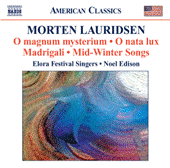If I were Morten Lauridsen and my work was in the artistic care of a choir like the Elora Festival Singers I would feel that my creative vision was in exceptionally good hands. Although O nata lux (a movement from the larger work Lux aeterna) and O magnum mysterium have been recorded numerous times, they never have been done better–or more movingly–than here. And notably, the timing of the latter, at just short of six minutes, effectively demonstrates that (unlike the comparatively languorous performances by Polyphony and the Chamber Choir of Europe, for example) in this work slower is not better!
While the abovementioned pieces embody Lauridsen’s most familiar harmony/texture-based style, he reveals an entirely different musical character in the rhythmically and harmonically challenging Madrigali, six songs set to Italian Renaissance poems. Here the choir takes on the delicate, tricky-to-balance textures and wide-ranging dramatic declamations, perfectly capturing the varied moods and moments of these emotion-laden texts. Perhaps most compelling is Quando son più lontan, which in its expressive character and harmonic aspects is the most reminiscent of the love-and-pain madrigal style of Marenzio, Gesualdo, and Monteverdi. Amor, lo sento l’alma is as impressive for its rhythmic audacity as the following Io piango is for its appropriately biting harmonies. In the set’s final song, Se per havervi, oimè (If, alas, because I have given you my heart…), Lauridsen’s signature harmonies make return appearances while expanding into more distant, less predictable regions; but it’s hard not to be distracted–and enchanted–by a repeated little curling five-note melodic figure. More than an ornamental device, it’s like a musical gesture of the lover’s pleading while also representing the flame of passion that consumes him.
The first of the Chansons des Roses (set to Rainer Maria Rilke poems) is the familiar chordal style of Lauridsen’s O nata lux and O magnum mysterium, just sung at a much faster tempo–and in French. And in fact, the following numbers in the set are all in the same harmonic/melodic realm, concluding with perhaps Lauridsen’s most-performed piece, Dirait-on, which includes a piano accompaniment–as do the five Mid-Winter Songs (to poems by Robert Graves).
As with the Madrigali, this last cycle–from 1983–is among Lauridsen’s more technically demanding choral works, and again, although you can find several other recordings of it from very fine choirs, none surpasses this virtuosic performance, admirably partnered by pianist Leslie De’Ath. The sound, from the choir’s home venue in Elora, Ontario, is first-rate. Informative program notes, full texts and translations are included–and happily, so is publisher information for all the music. Highly recommended. [11/13/2009]
































